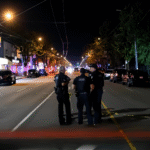The war between Russia and Ukraine has entered a dangerously volatile phase, with growing fears of escalation. In light of this, the United States has decided to temporarily close its embassy in Kyiv, citing the risk of airstrikes targeting diplomatic facilities. Here’s an in-depth look at the latest developments, the fears surrounding this conflict, and how Europe is preparing for the worst.
US Closes Kyiv Embassy Over Airstrike Fears

As the Russia-Ukraine war intensifies, the United States has taken the precautionary measure of shutting down its embassy in Kyiv. The US Department of State issued a statement highlighting concerns that the embassy could become a target for Russian airstrikes. US diplomats have been advised to seek shelter in safer locations until further notice.
This decision comes amidst heightened tensions after the US granted Ukraine permission to use long-range missiles against targets inside Russia. The US approval has made the situation even more precarious, with Russia responding with threats of severe retaliation, including the use of nuclear weapons.
Tensions Surge After US Approves Long-Range Missiles for Ukraine
The approval of long-range missiles by the United States has significantly escalated the conflict. These weapons enable Ukraine to target deep inside Russian territory, putting critical Russian military and political infrastructure at risk. Russia has reacted strongly to this move, with President Vladimir Putin signing a new nuclear policy that includes the possibility of using nuclear weapons in response to any attacks involving long-range missiles.
This development has pushed the war closer to a potential nuclear conflict, as Russia perceives these missile strikes as an indirect involvement of a third country—something that could trigger severe retaliation. Experts are now debating the potential for nuclear escalation in the ongoing war.
Europe on Edge: Countries Preparing for Potential Fallout
The threat of the conflict spilling over into a wider war is now looming large over Europe. Countries like Norway, Sweden, and Finland are on high alert. These nations have advised citizens to stock up on essential supplies, including food, water, and medical items, in preparation for possible wartime shortages.
Sweden has gone a step further, instructing its citizens to purchase iodine tablets in case of a nuclear fallout. These actions are a clear signal that European governments are bracing for the possibility of a catastrophic escalation, which could involve NATO and other global powers.
The World Watches as Tensions Rise: Is a Third World War Imminent?
The latest developments suggest the possibility of the Russia-Ukraine war morphing into a much larger, global conflict. With Russia now openly discussing the use of nuclear weapons in retaliation for attacks on its territory, the stakes have never been higher. The risk of a nuclear strike on Ukraine or NATO allies has many wondering if this could be the trigger for World War III.
Dmitry Medvedev, Russia’s Deputy Security Council Chairman, has warned that any missile attacks on Russian soil will be considered acts of war. If Russia is attacked, it has signaled its willingness to strike back with full military force, including nuclear weapons. Medvedev’s statement points to the serious risks that lie ahead.
FAQ: What You Need to Know About the Ukraine-Russia War and Its Global Impact
1. Why has the US closed its embassy in Kyiv?
The US has closed its embassy in Kyiv due to the escalating threat of airstrikes from Russia, which could target diplomatic facilities in Ukraine’s capital.
2. How has the US contributed to the escalation of the conflict?
The United States approved Ukraine’s use of long-range missiles against Russian targets, which significantly heightened tensions between the two countries.
3. Could this conflict lead to World War III?
Many experts believe that the war could escalate into a global conflict, especially if nuclear weapons are used. Russia has indicated that any missile strikes on its territory would lead to severe retaliation, including potential nuclear strikes.
4. How is Europe preparing for a possible escalation?
European countries like Sweden, Norway, and Finland have urged their citizens to prepare for potential shortages and even nuclear fallout. Sweden, in particular, has advised people to stock up on iodine tablets as a precaution.
5. What is Russia’s stance on the use of nuclear weapons?
Russia has made it clear that if non-nuclear countries launch attacks with the support of nuclear powers, it will consider this an act of war and may retaliate with nuclear weapons. This threat has raised concerns about the potential for nuclear conflict.
6. What will happen next in the Russia-Ukraine war?
The situation remains highly unpredictable. As both sides continue to escalate their military actions, the risk of a wider conflict, including the involvement of NATO and the use of nuclear weapons, grows.
As the world watches this dangerous standoff unfold, the hope remains that diplomatic measures can avert a full-scale global conflict. However, with nuclear threats on the table and the situation evolving rapidly, the future remains uncertain.










